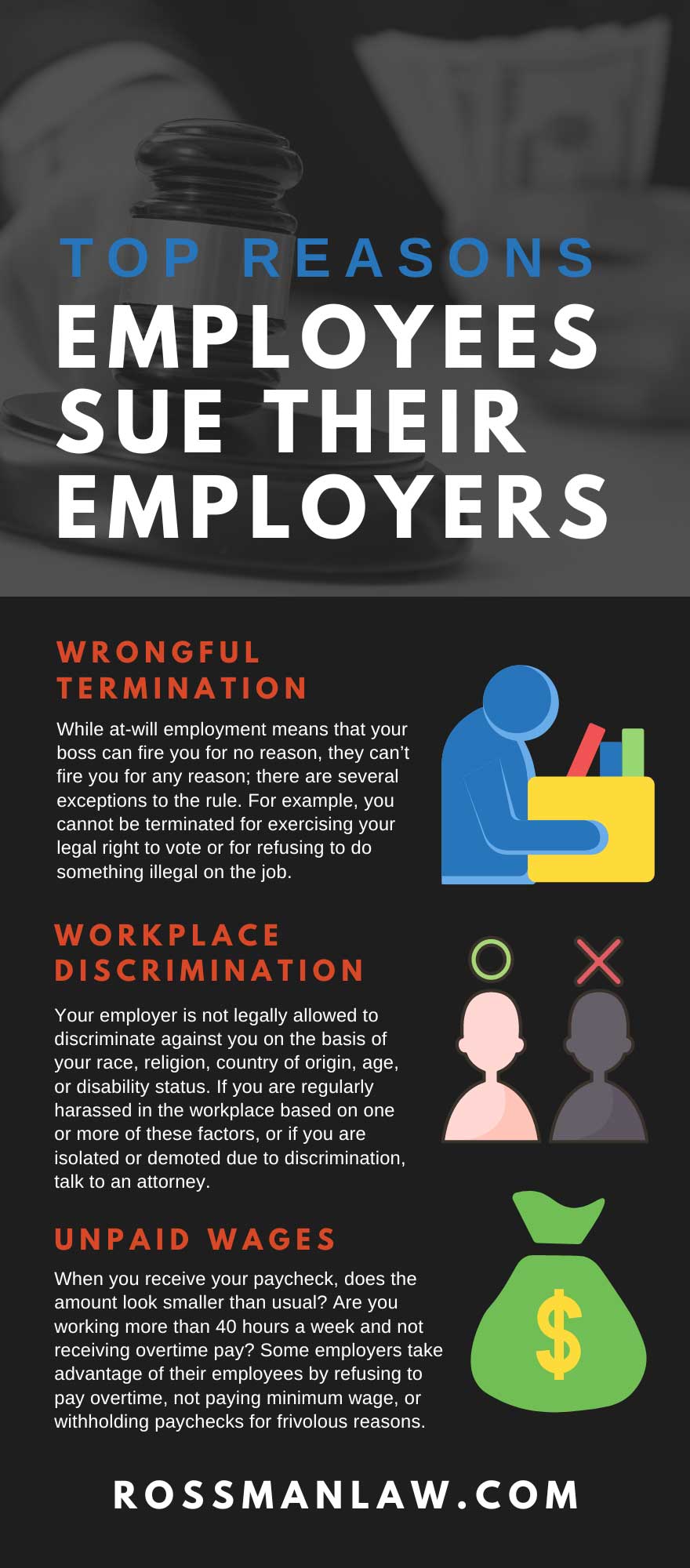
Know Your Rights to Reasonable Accommodation at Work
February 6, 2023
Objection! 4 Myths About Medical Malpractice Debunked
February 17, 2023Are you an employee thinking about suing your employer? There are many reasons why employees opt to do so. Filing a lawsuit against your employer can be difficult, but if your workplace is mistreating or discriminating against you, it may be your best option.
With the right legal representation, taking your employer to court can be a powerful way for you to get justice and compensation for your maltreatment. Rossman Law Group has compiled a guide to the most common reasons why employers get sued. Do any of the following situations apply to you?
Wrongful Termination
Most states, including Idaho, practice at-will employment. In other words, either the employee or the employer can end the working relationship at any time for a variety of reasons.
While at-will employment means that your boss can fire you for no reason, they can’t fire you for any reason; there are several exceptions to the rule. For example, you cannot be terminated for exercising your legal right to vote or for refusing to do something illegal on the job.
Workplace Discrimination
Your employer is not legally allowed to discriminate against you on the basis of your race, religion, country of origin, age, or disability status. If you are regularly harassed in the workplace based on one or more of these factors, or if you are isolated or demoted due to discrimination, talk to an attorney.
Discriminatory practices even creep into the hiring process. For instance, if you are a qualified applicant with a disability, and you are passed over in favor of a less-qualified applicant without a disability, something shady could be afoot.
Unsafe Working Conditions
Part of your employer’s job is to protect you and your coworkers from undue harm and risk of injury. If you work in a restaurant kitchen that violates several health codes and your employer refuses to fix the issues, they’ve created an unsafe work environment and can be sued.
Whether you’re working around hazardous chemicals without the provision of adequate personal protective equipment (PPE) or ordered to work with defective machinery, your well-being is at stake. Don’t expose yourself to severe risks without the proper protection.
Unpaid Wages
When you receive your paycheck, does the amount look smaller than usual? Are you working more than 40 hours a week and not receiving overtime pay? Some employers take advantage of their employees by refusing to pay overtime, not paying minimum wage, or withholding paychecks for frivolous reasons.
If something looks wrong on your paycheck, ask your employer why the discrepancy occurred. If you suspect illegal activity on their end, get in touch with a wage claim attorney and tell them your story.
Sexual Harassment
It is illegal to discriminate against an employee based on their sex, and sexual harassment is one of the most common forms this discrimination takes. From repeated and inappropriate comments about your appearance to requests for sexual favors in exchange for promotions, any form of sexual harassment opens your employer to litigation.
Are you being sexually harassed at work? Start keeping a detailed record of all interactions with the person harassing you. Talk to someone in your human resources department about your situation; if they refuse to provide any help, consulting with an attorney can be your next step.
Retaliation
Have you recently made a complaint in your workplace? Whether you told your boss about a problematic coworker or blew the whistle on illegal activity in the workplace, you have a legally protected right to complain.
If you find yourself demoted, isolated, or outright terminated after you made your complaint, talk to an employment attorney about next steps. You’ll have to prove that the alleged retaliation was the direct result of your complaint.
Denial of Reasonable Accommodation Requests
If you have a disability and require extra accommodations to do your job, the Americans with Disabilities Act (ADA) requires that your employer provide them, as long as they’re reasonable. For example, if you have vision problems, requesting training manuals and other documents in large print is a reasonable request.
However, if your employer denies a reasonable request, they are in violation of the ADA and open themselves up to lawsuits. There’s also a decent chance that they are discriminating against other employees with disabilities, so enlisting legal help is a good idea.
Defamation
If your employer says something outright untrue about you that causes you to lose out on better pay or employment opportunities, you may have grounds for a defamation lawsuit. Employers might make defamatory statements to retaliate against employees who file complaints or blow the whistle on illegal activity.
The key word here is untrue. Rude remarks may be discriminatory in nature, but are not necessarily defamation unless they’re total lies that damage your reputation.
Illegal Interview Questions
The Equal Employment Opportunity Commission (EEOC) mandates that job applicants be treated fairly and equally during the interview process. However, employers don’t always follow those rules to the letter.
For instance, women sometimes report being asked if they have kids or plan on having any in the future. An individual with a visible disability could contend with questions that focus on the nature of their disability instead of their ability to perform the job. Both of these examples are illegal and discriminatory.
Failure To Carry Workers’ Comp
If you are injured while performing job-related tasks, it’s your employer’s responsibility to have insurance that compensates you for medical bills and lost income. Businesses with more than one employee are legally mandated to have a workers’ compensation policy in place.
If you ask your employer about workers’ comp and their answer is, “Sorry, we don’t do that here,” contact an attorney as soon as possible. Your boss could be on the hook for costly fines and penalties, and you could sue them for personal injury.
Do any of these sticky situations describe your workplace? Contact Rossman Law Group for a free legal consultation and reliable, trustworthy advice. There’s a wide variety of reasons why employees sue their employers, and the reasons covered here are among the most common.
You shouldn’t have to put up with an unsafe or hostile work environment just to collect a paycheck. If your employer’s actions—or inactions—interfere with your ability to get your work done, you may have some legal recourse. Tell your story to one of Rossman Law Group’s talented attorneys today.






